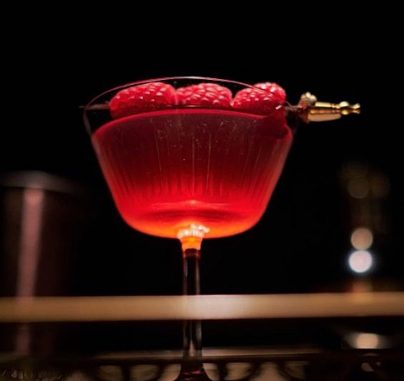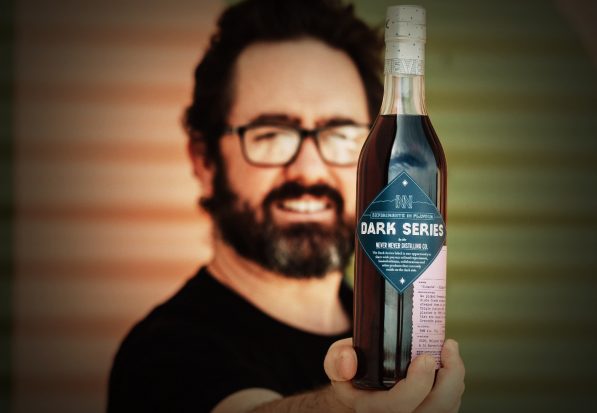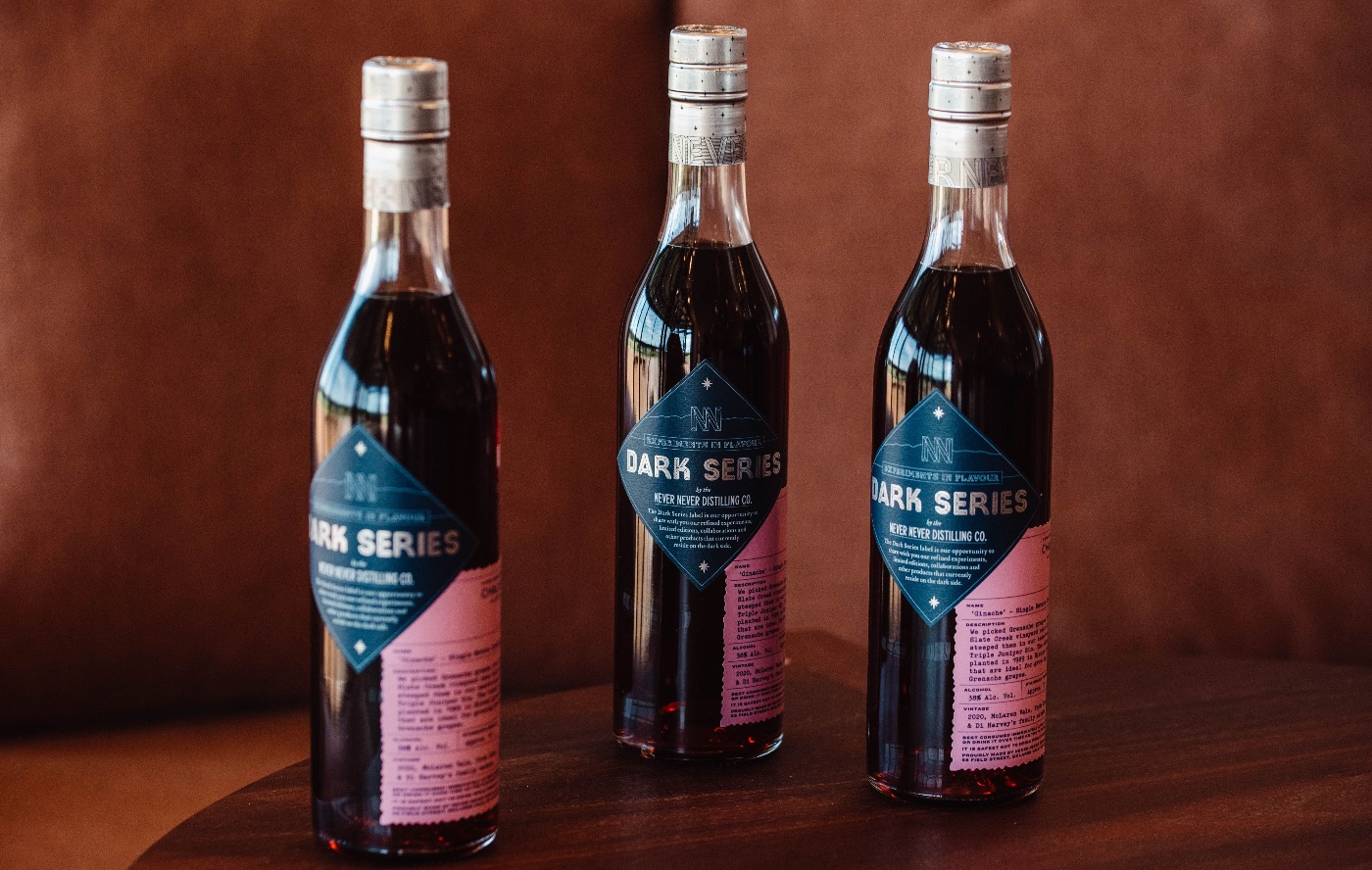While they may be considered a relatively young brand, Australia’s Never Never Distillery have very much taken the world by storm with their innovative juniper-first distillations.
And their efforts have not gone unnoticed, as their recent win at the World Gin Awards for world’s best classic gin, will attest.
Yet it is their new distillery in the South Australian wine region of McLaren Vale, that has influenced their latest expression, a wine-based gin.
We talked to Never Never’s brand director, Sean Baxter, about Ginache, working with grapes. And of course, what cocktails this new liquid will work best in.
While they may be considered a relatively young brand, Australia's Never Never Distillery have very much taken the world by storm with their innovative juniper-first distillations. And their efforts have not gone unnoticed, as their recent win at the World Gin Awards for world's best classic gin, will attest. Yet it is their new distillery in the South Australian wine region of McLaren Vale, that has influenced their latest expression, a wine-based gin. We talked to Never Never's brand director, Sean Baxter, about Ginache, working with grapes. And of course, what cocktails this new liquid will work best in.
Thank you for joining us, Sean.
Well, pleasure Tiff and you got there. Yes, it is the Ginache. I think when I put that together, I was like, "I wonder whether or not people will get it. Hopefully it'll work out."
Now, more than any other country, Australians seem to be dabbling in wine-based gins. Why do you think that practice is so prevalent here?
It's a great question. I do think the Australian audience makes a big difference. We're very active in our wine education. I think when you look at our ability to, I guess, understand varietals, we're quite advanced I think, in terms of the way that we drink. Even 20 years ago, it would basically just be a glass of white or a glass of red. Now, even the most limited wine drinker would be able to brand call the difference between a Sauvignon Blanc and a Chardonnay. And I take that pretty much from my mum, who's grown up in Scotland, came over to Australia when she was in her mid 20s and she pretty much just drank box wine up until she was 40 and now, still drinks a variety of different varietals that she's picked up along the way, so I think it has a lot to do with our education.
And how much of an appeal do the wine-based gins have overseas, do you think?
I think that they really represent the Australian drinking vernacular a little bit more readily than anything else. We don't really have a traditional culture or a spirit culture here, like again, rum was consumed in Jamaica and lots of other places before it was born from Australia. I think when it comes to the way that we're able to uniquely, I guess, interact grapes like Shiraz, grapes like Grenache, into a gin style, it's a really clean representation if you like, of Australian flavour. Now, on one hand, you do have native character that certainly does demonstrate it more but I think from a pure availability or an understanding of availability, the wider consumer understands what Shiraz might taste like, more than something along the lines of all the native ingredients that we like to promote.
Obviously the choice of Grenache has been very much influenced by your neighbours at Chalk Hill in McLaren Vale, where you've moved to. Now, I believe that's a grape they specialise in.
Absolutely. Those guys smash it. When it comes to award winning Grenache fruit, the guys at Chalk Hill are leading the way. And I guess it was indicative of trusting our collaborative partners, which is what we've done with all of our collaborations. We use our collaborations not only to create delicious products but also to help us along the way, to give us an education around the best way forward when it comes to some of these series releases. Chalk Hill have been growing Grenache for decades and decades. When it comes to trusting their intuition, when it comes to the fruit that they've created, it certainly has been a revelation to us, as it's been a wonderful writer to go on so far.
If people aren't familiar with Grenache as a grape, can you describe the flavour, especially against other wine varietals?
Certainly. And this is coming from myself who is certainly not, as you say, a very well-experienced wine drinker but I guess the way that I like to see the difference between I guess, Grenache and other varieties, is that it's this wonderful medium bodied style. It's nowhere near as dark and as earthy as Shiraz but it's probably not as bright as some of the Pinot that you see on the market. For me, it's this wonderful medium bodied flavour that is packed with flavour such as orange rind, raspberries. It can get darker all the way through to plum or tobacco but you'll find it's usually quite medium bodied, medium acidity with lots of plush berried character. And it's a real crowd pleaser. It's been a part of Australian viticulture for centuries and centuries. It's actually one of the very first varieties of grape that was planted in Australia.
When you mix it with your gin base, what flavour does that bring out in the gin?
That was really exciting for us because when we were experimenting with triple juniper gin, which forms the base of the Ginache, we were looking at the way that some of those spicier characteristics, certainly things like botanicals, such as cinnamon and also pepperberry, would interact with the darker characteristics that you find in Grenache but what was really fun and really inspiring, was to see the way the lighter flavours played, which was we used citrus peel, such as lime and lemon and they're very prevalent on the nose. And when it comes to a wine-based gin style, we're really excited to see the way that our citrus played with the red fruit character. The way that that lemon balm works so beautifully with things like raspberry, was a massive beautiful play for us. And it really speaks with a very flexible gin style that has a variety of different applications in the drinks category.
We'll get to cocktails and how it can be drunk a little bit later but you mentioned that you chose the triple juniper as the base. Why was that?
I think it has a lot to do with the fact that for us, it's the most flexible of our styles. As you progress to the Southern Strength and Juniper Freak, they certainly are more concentrated towards a savoury, than a more juniper forward approach. When it comes to the triple juniper gin, it has a very flexible style. It's always been able to be used across a variety of different classic cocktails, for example. When it came to being able to work beautifully with the flavours found in the Grenache [inaudible 00:07:53], we found it to be certainly the most susceptible to be able to mold into that flavour that we wanted.
Do you want to describe the tasting notes? What the nose and the palate and all of that would be for this particular expression?
I think the beautiful part about this was that we were just so impressed with the way that suddenly colour came into our play. Usually when you're talking about flavour profiles, you really ... In gin, colour never comes into it. And this is our first expression that has that. And for us, the cherry red rose gold hue was bright and luminous, was such an immediate appealing thing. And when it's diluted, it has this beautiful ripe watermelon pink to it. Whether or not you're using soda or tonic water, it has that same appeal.
The flavour is very much on the nose. It's all bright raspberry, a little bit of that lemon balm character coming through. And again, the subtle of hint of juniper still sits there on the nose as a reference, almost a pine needles. It still sits there, quite present. The palate is really fun. I love the fact that it reminds me of Cornerstone Redskins, that sweet musky flavor. There's definitely almost a strawberry jamminess or a strawberry Kool-Aid there but there's still these tannin and that's really important. It can't just be a big sweet, sticky liqueur. There still needs to be something there, that it's referencing that wine character and almost a Pink Lady tannin sits there around the mid palate and leads off into quite a dry and long finish, where the juniper still comes through. And there's still this little hint of sour cherry in there as well. It's a very fun and a very flexible gin style.
By the sounds of it, it's automatically Instagram-able. Do you think that people who are looking for pink gins, are going to be drawn towards this particular expression?
Absolutely. I think that when you look at the way that the pink gin revolution has I guess, captured the imagination of the entire category, there will definitely be a section of consumers that are drawn towards it. And they're an important bunch of consumers. They're bringing people into the gin market. And what we're hoping to do, is to bring people into our brand to understand the flavours that we stand for and to begin exploring the rest of our portfolio as well. I think we'll also appeal to a wider range of wine lovers and wine appreciators as well, who are also beginning to experiment with spirits, stepping away from the wine for every occasion and looking at flavours that they understand that might sit in a slightly different format
Talking about your portfolio, you've released this expression as part of the dark series. Can you tell us a little bit more about what the dark series is about and how you decide whether things are included within it?
The dark series for us, was a place where we liked to experiment. It was built out of this idea of what we do in the shadows, this slightly obscure place where we position other products that we aren't a hundred percent sure on but potentially we're working through, brands like Southern Strength gin and also our Juniper Freak gin both started off as dark series products, which we honed and then later released as core releases. And that's the purpose for dark series. Now, not all of our dark series products will see the light of day, will become core releases but for us, it's this wonderful place where we can continue to test and trial liquid, albeit in a very limited release capacity. It's also where we do a lot of our collaborations. We've done some amazing collaborations with PS40 in Sydney, with our Aquavit and Blackpearl in Melbourne, with Black Juniper Amaro. Both of those products still currently sit in our dark series. And we love the way that especially bars around the country support those two products.
In a way, it's almost the experimental corner of your distillery.
Absolutely. It's where we just lock Tim up so he can play around. Tim's our head distiller, by the way, for your listeners. And it's where we allow him to go a little bit nuts with some of the weird or wacky ideas that he comes up with. It's definitely a fun part of it. We are in this industry to have fun. We really like to use that space as a way of seeing how people respond to slightly obscure and slightly left of centre liquids.
Do you imagine that wine-based expressions will be something that you will continue to do in the future?
It's a great question, Tiff. And when it comes to what we are currently experiencing, which is this surge in popularity of these wide varietal styles, I would certainly not rule it out. As you drive up the driveway towards our distillery, it's unavoidable when it comes to the amount of vines that you can see from our hilltop. It's the perfect spot to consume something that is a wonderful amalgamation of both gin and wine. For the moment though, we really want to focus on our Ginache and how we can actually, I guess, expand that particular product. At the moment, it's quite a challenging product from a production perspective because it's very limiting in how much you can make at once. It's not like a normal gin, you are subject to availability and many other restrictions. We're all about making sure we're able to create something that can scale first, before we start looking at potentially other expressions.
Tell us a little bit about how the Ginache is actually made.
Absolutely. I think the biggest limitation when it comes to volume is certainly the availability of fruit. Grenache is still a very small component of the McLaren Vale's overall vintage and when it comes to, I guess, the availability of fruit this year, on top of the absolutely devastating effect of bush fires all across the country, there has been a shortages of fruit.
This year we were certainly, I guess, subject to that. Well, what we do is we pick the fruit when it's ready. That's very, very important because when that fruit is ready, it will effectively create the most immediate amount of red fruit character that we want to be able to achieve. We distill it. We then crush it. We then make a Triple Juniper Gin style, which we keep at a very high ABV. The main reason for that, is that we don't want to let the grapes or the fruit sitting in a product that's going to take a while for that infusion process to happen. We want to keep that true integrity at its optimum, which means you have to do it very quickly. And that's one of the limitations in terms of how much we can make. We just simply didn't have enough room to be able to make vast quantities of it because for that, you need big vats and lots and lots of quite particular equipment.
Ultimately, it is all about making sure that you get that high proof gin onto that fruit as quickly as you can, after picking. It then sat on skins for roundabout a month. After that process, we strained off the liquid. Effectively, what you'll find is that the grape juice itself is doing the dilution for the gin. We then pressed the remaining fruit in order to extract the final flavour of ... or the final remnants of that gin. And we then went through a blending process to make sure that there was the right balance between both of those two separate liquids. We then did a very light filtration to make sure there was no actual solids that were coming through the process and we then bottled it. And so start to finish, the process was very quick and that was important. Now, it's also about making sure that consumers drink it quickly as well because when it comes to this particular product, just like any gin out there that's flavoured or coloured, if you like, with natural fruit character, it will certainly change over time.
I imagine that working with grapes was a whole new experience for you guys. How was it? And was it what you expected?
It was actually an amazing little adventure for me personally because I wasn't the one doing it. I got to sit back and taste all the hard work when it was finished but Tim Boast, who's our head distiller and also Jessica Hodge, who's one of his assistant distillers, she had a lot of background in wine making and is quite well known here in South Australia for her wine making prowess. It was great to have her on board as well, to be able to assist us in some of the finer details when it came to actually working with grapes.
Of course, when it comes to our lovely neighbours, the Harveys were absolutely instrumental in being able to not only provide us with an incredible patch of fruit to be able to select from, they were also there to assist us with that journey as well. We can't wait to do it again. It's a really exciting process because it's so dependent on the fruit integrity. It's so dependent on when you're picking, how the season has been, the vintage itself has such an amazing expression of how successful the actual release is going to be. We can't wait to see how that develops and changes over the years because it's definitely something we want to do again.
If someone is approaching the Ginache, how would you recommend they first taste it?
If someone's approaching the Ginache, I would definitely do it rapidly because there is bugger all left. When it comes to tasting it, it's very accessible. It obviously has a sweetness to it. And that sweetness is a hundred percent from that grape flavour and those and those natural sugars. Even for people that potentially aren't very comfortable drinking neat spirits, something like the Ginache is very easy to understand. Not only because most people get a good understanding of what great character might taste like but they also get an understanding what gin tastes like. When you actually taste it neat, it is a meeting of those two worlds. And for me, it's a wonderful thing to actually consume just cold.
You hinted at the fact that it has been a very limited release. How many bottles did you actually make?
We made just a tick under 2,500. I say just a tick because I can't remember how many I've drunk now but it's been at least six or seven. Yeah, there's 20 before we put it on label, when they were clean skin. There's about 2,500 bottles in this run, which for us, is by far and away one of the smaller runs that we've ever done with the dark series. Of course, our very first dark series, we made a hundred bottles of Southern Strength and we sold that in a weekend. We've always decided, "Okay, if we're going to go through this process, we need to make sure we at least make five or 6,000."
That was just not something that we were able to do, due to the fruit availability. It will go very fast and we make no apologies for that. We're happy with this particular experiment and we'll have to wait until the next vintage to see it pop it's head up again.
And I'm assuming by next vintage, you mean next year?
That's correct. Yeah. Basically, we'll be looking at doing this around the same time each year, February, March. And again, entirely dependent on the grape.
You were talking about the bottles that you've been drinking. How have you been drinking it?
Well, my wife would atest far too quickly but I would probably suggest it in a variety of classic serves because for me, those classics serves really showcase its flexibility and how easily it does work. I've enjoyed it as a Tom Collins. I think that for me, is probably the strongest serve, just because it is just such a simple but beautiful way of consuming gin. I don't think enough people drink a Tom Collins these days, which is simply a marriage of gin, lemon, juice, sugar and a splash of soda water, served in a tall glass with a slice of lemon. It creates this beautiful, almost punch-like experience in terms of the variety of different flavours that are going on in there. It feels like you're drinking a far more complex cocktail when in actual fact, it is very simple in its structure.
I do like it as a gin and tonic. I prefer to drink it with less tonic. There is sweetness in the gin, so if you use it as a standard gin and tonic serve with 30 mils and 120 mils of tonic water, I find it has get a bit sweet. I do like it maybe 30 mils of gin to about 60 mils of tonic water. I serve it quite short, in a short glass over a big rock of ice. And I quite like that. And of course, if you like a negroni ... I find most people that like a negroni will drink a negroni with any kind of gin to be fair but this one does make a particularly good one. Especially if you find a vermouth that is, I guess, representative of the Grenache style that we've selected. Often we'll find a lot of the beautiful Australian vermouths that are knocking around today, work really, really well with the Ginache.
You've mentioned vermouth, also the bitterness of Campari and citrus as being flavours that work well with this liquid. What other flavours could people experiment with, as far as cocktails?
I absolutely love everything that the guys at Marionette do. I think they are superstars when it comes to liqueur flavour here in Australia. There is a particular cocktail called the Charlie Chaplin. Very, very famous cocktail, that's traditionally served with slow gin. If you place the Ginache in place of slow gin in this particular recipe and use equal parts Ginache, apricot brandy and wine juice, quite a simple recipe, shaken and strained into a cocktail glass, you will get this wonderful sherberty, bright pink delicious cocktail that has wonderful depth and wonderful complexity. I would certainly recommend ... If you know your way around a cocktail tin, to potentially go out and find yourself a delicious apricot brandy and give it a try.
If people don't know their way around a cocktail tin, let me ask you, what is the reaction of bartenders being to the release?
Well, bartenders were one of my biggest ... I was really focused on creating something that bartenders wanted to pick up as well. That's always been a focus of Never Never. And so far, it's been amazing. This is one of those spirits that is again, very easy to understand, jumps off a cocktail list and it speaks to the wine consumers. And again, that's a really important thing when it comes to up-selling someone from a gin and tonic onto a cocktail. If you can bring that world into your cocktail list, it makes it more appealing. I think the idea of having something that's easy to understand, where a lot of the hard work has been done for you in terms of complexity of flavour. All you're needing to do is just brighten the edges and add your own creative twist to it. I think it certainly has the capacity to be very, very popular in bars or restaurants around Australia.
If people are using it in a more aperitifs style fashion, what food do you think would work well?
Oh. Now, that's another amazing question. It's hard to go beyond traditional pairings when it comes to Grenache, it still represents that albeit slightly more gin forward in its intensity. I still love the way this plays with soft cheeses in the place of things like fig pastes. The creaminess and the richness of double cream or triple cream cheeses has the capacity to be cut through with the acidity that can still be found in the Ginache. There still is an acidity that's associated with the wine. It does have the capacity to be able to cut through those richer flavours. I do love it with a duck liver parfait or something that has that wonderful mouth coating buttery-element that works out perfectly with the styles of aperitif. Those would be my two choices, I think. And of course, you can never go wrong with olives and almonds, two other products that are massively a part of the McLaren Vale region in terms of production and certainly find their way onto many pairing lists around the region.
Now, unfortunately you're not in a position ... Well, no one is in a position at the moment to be able to have guests to their cellar doors, to be able to do food pairings but can you tell people what you've found so special about the Chalk Hill area, where you are in McLaren Vale?
When I was very young, I grew up on a farm and a lot of the adults I had interaction with when I was a young man, were farmers, were producers, were people that were really born from the land and they're a very different type of personality. And I don't think I had truly interacted with too many of them in my adult years as a bartender and then as an ambassador, until I reached McLaren Vale and started having conversations with local, started speaking with Tom and Jock Harvey, the two brothers that run Chalk Hill Wines. It's incredible to meet those characters and to see how genuine and how generous they are, not only with their time but also their knowledge. For me that has been such an incredible part of being welcomed into that particular part of the world, is to experience that, I guess, rural hospitality or regional hospitality, which was something that I had forgotten about.
Now, hopefully with any luck, people will be able to get up to Chalk Hill fairly soon but in the meantime, if they're looking to buy this expression, has it been released wider than just your website or is it just the website because it is so limited?
We're currently trying to control the release because it is so limited, by selling it through our website but our distributors are also selling it as well. You'll be able to find it in some very, very select independent retailers around the country. If you are looking for it, certainly call up your local Indie and request it immediately because we do have a very small amount, around about 5 to 600 bottles that have gone through our distribution company. And again, which is Proof and Co, I should mentioned. And they are distributing it across to a very small number of other retailers.
Obviously it won't be the case for this release but next year, when hopefully it will be a larger release, will you be exporting at all?
It's a great question, Tiff. And it will certainly depend upon the state of the world and where we are at as a business. I guess we would love to see how this particular product interacts in the UK and US markets, especially off the back of the success of other amazing representations of the category, light bodied Shiraz. For us, we want to really focus on growing and building the business locally first and go through that rebuilding phase. If by this time next year, we're considering exporting the product, that'd be an amazing, amazing acceleration of where we think we'd be but I still think it's ... We want to aim high. And that would be our goal, certainly.
Basically, if you're local to Australia, get it quickly. And if you're not, "You may have a little while to wait."
That’s it, we'll see how it goes. I daresay it's definitely going to be a product that we're going to continue to experiment with and release. We are actually holding on to a significant amount of bottles for sale at the distillery. We didn't want to sell everything through our website and then leave nothing for our distillery door when we open up in June. Despite if we sell out online, we're still going to make sure that we have someone on site, which will hopefully bring a few more people up to visit our beautiful space.
Cool. Well, we encourage people to go but in the meantime, if they want more information on the Ginache, they can obviously go to your website, which is neverneverdistilling.com.au.
Thank you for joining us, Sean.
What an absolute pleasure, Tiff. Thanks so much for having me.
Cheers.









